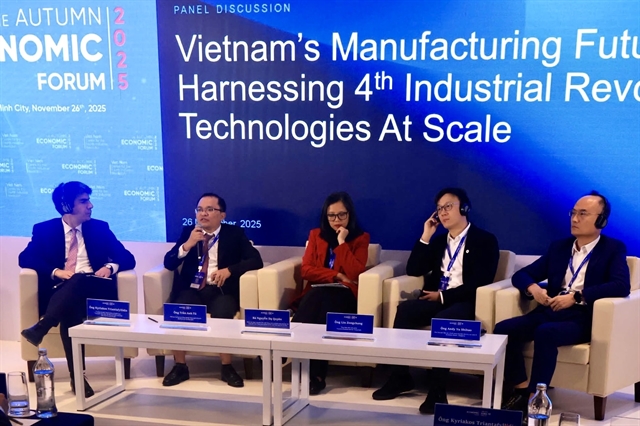 Economy
Economy


|
| Trần Anh Tú (second from left), deputy director general of the Department of Information, Technology and Industry, presents solutions for the business community at the event. — VNA/VNS Photo |
HCM CITY — Việt Nam is accelerating plans to modernise its industrial sector through smart manufacturing, green production models, and broader adoption of Industry 4.0 technologies, a senior official from the Ministry of Science and Technology said on Wednesday.
Speaking at the 2025 Autumn Economic Forum in HCM City, Trần Anh Tú, deputy director general of the Department of Information, Technology and Industry under the ministry, outlined a structured roadmap aimed at helping domestic enterprises, especially small- and medium-sized ones (SMEs), transition toward smarter, more sustainable, and globally competitive production.
The forum, held annually, brings together government officials, business leaders, academics, and experts to discuss economic development, innovation, and industrial transformation in Việt Nam.
Việt Nam’s industrial strategy focuses on three directions, starting with a realistic approach tailored to SMEs, which dominate the country’s business landscape, he said.
“Small- and medium-sized enterprises cannot be expected to immediately adopt advanced technologies such as AI or full automation,” he added.
Most firms remain at the digitisation and data-building stage.
Government support focuses on step-by-step upgrades, from basic digital tools to automation and eventually systems integrating AI, big data, and IoT, which is similar to global leaders such as Foxconn.
The second pillar is the State’s role as facilitator. The Government is completing legal frameworks and developing technical standards essential for smart production.
“Standardisation is crucial because it allows successful models to be replicated and applied widely,” he said. Capacity-building initiatives include expert consultations, training programmes, and exposure to best-practice industrial models.
The third direction involves connecting SMEs with universities, research centres, and industry experts to gradually master new technologies through joint projects and technology transfer, which is key for scaling up smart manufacturing across sectors.
The ministry recently submitted a List of 11 Strategic Technologies, including AI, blockchain, and IoT, alongside 35 detailed technology categories to guide enterprise investment and research priorities.
A National Programme for Strategic Technology Development will also identify six core technologies for 2025.
Revisions to the Law on Science, Technology and Innovation now embed innovation into legislation and place enterprises at the centre of national innovation efforts.
Additional amendments are being drafted for the Law on Artificial Intelligence, Law on Digital Transformation, and Law on High Technology.
Talent and financial support
Human resource development is central. New regulations allow the recruitment of “chief scientists” and other top experts to support enterprises and national projects. The Law on Digital Technology Industries provides a framework for workforce upskilling and talent development.
The National Technology Innovation Fund helps SMEs adopt new technologies, upgrade production lines, and access guidance during technology transfer.
The ministry operates 20 overseas representative offices to link Vietnamese enterprises with international experts and research networks.
Domestically, support is available through the National Innovation Centre, the Centre for Industry 4.0 in HCM City, and a network of technology transfer centres nationwide.
“Every enterprise can start with small, achievable steps,” Tú said.
“With a supportive policy environment, growing technological ecosystems, and collaboration across government, industry, and research institutions, Việt Nam can move toward smart, sustainable, and globally competitive production.” — VNS